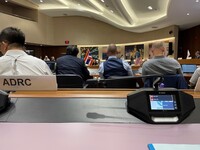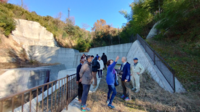15 November 2023 (Online)
ADRC's Online Tsunami Seminar held on 15 November 2023 dwelt with the "State and Challenges of Community-Based Tsunami Preparedness." It is essential that communities living in tsunami-prone areas prepare for tsunami disaster through awareness-raising, evacuation drills, and early warning systems (EWS). The speakers at the seminar concluded that if tsunami preparedness is integrated in the daily lives of residents, it helps save lives and reduce the impacts on properties and livelihoods.
Mr Gerry Potutan, ADRC Senior Researcher, moderated the session to achieve two key objectives: 1) share community-based tsunami preparedness programs and activities; and 2) discuss challenges in implementing community-based tsunami preparedness activities in different countries. Three speakers from ADRC member countries were invited to broaden and deepen the discussion.
Ms Thai Minh Huong, Officer of International Cooperation Science and Technology Department, Vietnam Disaster and Dyke Management Authority, Vietnam, reported that while Vietnam has not experienced tsunami disaster yet, the government has been mobilizing the communities and schools to prepare. The activities include: awareness-raising on tsunami at schools and commune, regular organization of tsunami drills, and installation of tsunami early warning system. Ms Huong noted that tsunami disaster-preparedness in Vietnam is a proactive approach, stressing that "although there was no prior tsunami experience in Vietnam, it does not mean it will not occur." In the same light, the government is facing a challenge to convince communities in areas where tsunami may occur to actively participate in the preparedness programs.
Mr Ranjith Alahakoon, Assistant Director at the Polonnaruwa District under the Ministry of Defence, District Disaster Management Unit, Sri Lanka, said that some coastal communities in Sri Lanka were impacted by the Indian Ocean Tsunami of 2004. With that experience, the government has been implementing a tsunami preparedness program, including the establishment of the community organizations (VDMC). However, one of the challenges VDMCs face is that they do not have any "legal status," therefore there had been cases where the government could not provide them financial supports. As a result, VDMCs do not have "active engagement" in the preparedness programs introduced by the government for lack of "ownership." One lesson from this experience is that "top-down" approach with no legal fund transfer could be challenging.
Dr NAKANO Genta, Assistant Professor, Research Center for Disaster Reduction Systems, Disaster Prevention Research Institute, Kyoto University, Japan, reported that the community-based preparedness efforts have evolved through past tsunami experiences. Recently, a more organized approach that adopts a "collaborative model" to community tsunami-preparedness has been promoted in Japan. Showing the case of Okitsu community in Shimanto Town of Kochi Prefecture, he explained that this model assigns responsibility to every collaborating partner, where: 1) volunteer organization links the school, municipality, and expert; 2) elementary school educates the children to protect themselves from tsunamis; 3) town government implements infrastructure improvements; and 4) university provides specialized information on earthquake and tsunami disaster. One example of the collaborative activity is the elaboration of "bosai map," wherein students are taught to think about necessary tsunami evacuation measures.
In the closing remarks, Mr SASAHARA Akio, ADRC Executive Director, stressed the importance of regularly conducting awareness-raising activities on tsunami disaster so that knowledge is transferred, shared, and not forgotten.
You can visit the webpage for the Tsunami Online Seminar 2023 in ADRC website for more information:
(2023/11/22 15:00)




